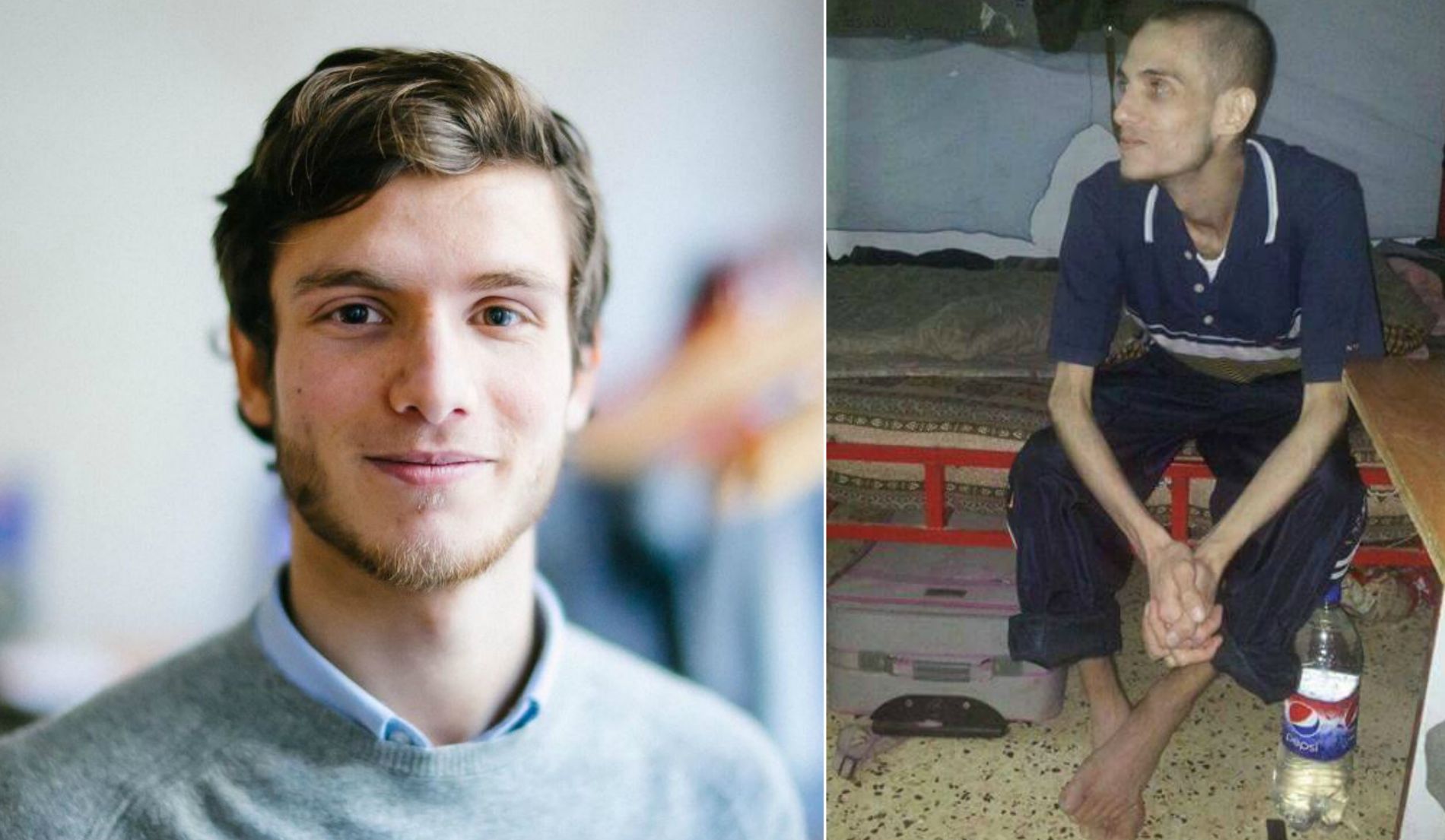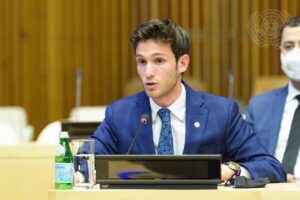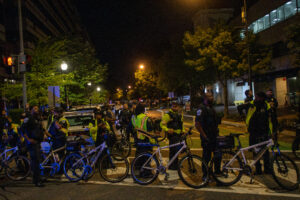Content warning: This article references sexual assault and torture.
Omar Alshogre went viral when he announced on Nov. 1 that he was admitted to Georgetown University for the spring semester.
At age 25, Alshogre has become well-known as a human rights activist and public speaker, sharing his experience as a prisoner under the Syrian regime of President Bashar al-Assad. Alshogre agreed to sit down for an interview with The Voice to discuss his life and his work.
“We lived a normal life, we had everything we wanted,” Alshogre said of his life before prison. He grew up in a scenic village in Syria and developed a passion for taming birds, which he demonstrated by showing off his impressive talent for replicating bird calls. “I lived as a cocky kid like everyone else. My father was trying to get me to study and I didn’t want to study.”
But this normal life was upended once war broke out against the current regime in 2011 and Alshogre began to participate in anti-Assad protests. Alshogre was arrested numerous times by Syrian authorities and each time was subjected to increasingly brutal torture including beatings and electric shocks. Still, Alshogre would always immediately return to the front lines of the protests after he was released.
Then, in November of 2012, Alshogre was arrested for the seventh and final time along with three of his cousins. He was taken to Branch 215, a military detention center in Damascus. In his year and a half at Branch 215, detainees were subjected to cruel human rights violations, including torture, rape, and execution. Prisoners were also coerced into giving false confessions under torture such as admitting to killing Syrian officers or carrying arms. These forced confessions were kept on file so if any of the prisoners went to court in the future, the confession would be sufficient evidence for the judge to sentence them to execution. Alshogre’s cousins Rashad and Bashir both died at Branch 215.
While at Branch 215, Alshogre was responsible for tagging all of the dead bodies, by writing numbers on their forehead and transporting them from their cells. Through this position, Alshogre began to take risks to try to save the lives of his fellow prisoners. When detainees who had refused to confess died, Alshogre would switch their “clean file” with that of another prisoner who had been forced to confess, which he did for Bashir after Rashad died.
“I wanted to take responsibility,” Alshogre said. “Risking my life wasn’t a big deal because I will die anyway in prison.” If caught tampering with the files, Alshogre would have immediately been tortured and killed.
Alshogre was transferred in August of 2014 to Saydnaya, a notorious military prison described by Amnesty International as a “human slaughterhouse.” Here, he was tortured even worse than before, saying that “215 was heaven compared to Saydnaya.” He was sure that he would not live to make it out.
Then, one day in June of 2015, the prison guards drove Alshogre out of the prison to the side of the road and performed a mock-execution before driving away, leaving Alshogre to wonder how he had survived.
It turned out Alshogre’s mother, who had escaped to Turkey after the government’s military forces killed his father and brothers in 2013, paid a bribe of $20,000 to get Alshogre out. At the age of 20, he had finally made it out of Syria and took refuge in Sweden where he completed high school and learned English, Swedish, and Norwegian.
With his new freedom abroad, Alshogre continued fighting for the Syrian people. He has shared his story with people across the world and has testified for European war crimes investigators to help build cases against top Syrian security officials. He’s also taken his testimonial to America, testifying before the U.S. House Foreign Affairs Committee and advocating for support of the Caesar Act which placed sanctions targeting top Syrian officials.
“I suffered a lot. I’ve been tortured for three years and my father, my brother have been killed. I lost my childhood friends, and my school was bombed and my village was burned. All of that. And I tell that story in a way where people can listen,” he said.
Alshogre has also worked with Boston Consulting Group as a management consultant where he speaks about diversity and trauma. Alshogre has stressed the need to address the actions of the Syrian regime not just through the perspectives of politicians or human rights activists but a wide variety of perspectives as well.
“War in Syria is war for everyone, for children, for adults, for the elderly, for doctors, engineers, economists. It’s based on corruption and corruption is based in all sectors and corruption is based in the economy,” he said. “We have to get those economists, those engineers, those doctors to be a part of the solution.”
It’s for these reasons that Alshogre plans to study business and entrepreneurship in the School of Continuing Studies at Georgetown while also taking electives in international affairs. “The best thing I can do right now is studying because the next step will be a regime falling,” said Alshogre. “The step after that will be rebuilding Syria. If I don’t have education, I can’t rebuild anything.”
Alshogre hopes to share his story with the students at Georgetown who may represent some of the next generation’s political, economic, and cultural leaders. “A lot of people in the U.S. have been living in democracy. They don’t truly, and can’t, understand dictatorship if they don’t live there,” he said.
Alshogre seeks to raise awareness about his experiences to combat misconceptions from people who have never met someone who is a refugee or survivor of extended violence.
“Survivors or refugees should not be treated as weak people,” he said. “The strongest ones with the strongest mentalities are the ones that came to you. They are strong people that need to be offered a chance in society.”
Alshogre firmly dismisses the idea that Syria is a war-stricken place condemned to perpetual violence and infighting. Instead, he said Syria is a place with a vibrant culture and education system just like anywhere else. “We grow up so normally, exactly like you do in the U.S. and then everything changed in 2011 because the war started,” Alshogre said. “It’s never been a civil war in Syria, it’s really a revolution between people and the regime.”
As Alshogre plans to arrive on campus in January, he hopes to hold conversations with Georgetown students and alumni over Zoom to further share his story with the community. He’s excited to experience the diversity of Washington, D.C. and create a network throughout Georgetown to continue his advocacy.
“I’m looking forward to, at Georgetown, building a great community that I can be useful for, can be useful for me, and we can together be useful for the world.”






